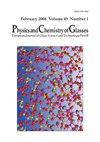Phase separation and the properties of lithium strontium silicate glasses
IF 0.3
4区 材料科学
Q4 CHEMISTRY, PHYSICAL
Physics and Chemistry of Glasses-European Journal of Glass Science and Technology Part B
Pub Date : 2022-01-01
DOI:10.13036/17533562.63.1.11
引用次数: 0
Abstract
The immiscibility region covers most of the region of glass formation in the lithium strontium silicate system. Although the density, refractive index, and thermal expansion coefficient are insensitive to the presence of phase separation, the glass transformation temperature can be used to determine the limit of immiscibility in this system. The dilatometric softening temperature was used to determine the boundary the limit of connectivity of the silica-rich phase. The electrical conductivity and activation energy for conduction were used to determine the limit of connectivity of the lithium-rich phase.硅酸盐锶锂玻璃的相分离与性能研究
非混相区覆盖了硅酸锶锂体系玻璃形成的大部分区域。虽然密度、折射率和热膨胀系数对相分离的存在不敏感,但玻璃化转变温度可以用来确定该体系的不混相极限。用膨胀软化温度确定了富硅相的连接边界和极限。利用电导率和传导活化能来确定富锂相的连接极限。
本文章由计算机程序翻译,如有差异,请以英文原文为准。
求助全文
约1分钟内获得全文
求助全文
来源期刊

CiteScore
0.70
自引率
33.30%
发文量
0
审稿时长
1 months
期刊介绍:
Physics and Chemistry of Glasses accepts papers of a more purely scientific interest concerned with glasses and their structure or properties. Thus the subject of a paper will normally determine the journal in which it will be published.
 求助内容:
求助内容: 应助结果提醒方式:
应助结果提醒方式:


